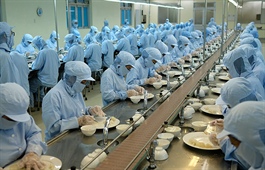Trade ministry aims to bring Vietnam Rice trademark into high-end markets
Trade ministry aims to bring Vietnam Rice trademark into high-end markets
Vietnam’s Ministry of Industry and Trade is drafting a strategy to increase the country’s direct rice export rate and boost the sale of the Vietnam Rice national brand to high-end markets by 2030.

The trade ministry is making a draft strategy to develop Vietnam's rice export until 2030, which highlights many solutions for boosting demand through negotiations, entering new markets, and increasing exports with a tariff reduction road map.
By 2025, the proportion of low- and medium-grade white rice will have accounted for no more than 15 percent of the country’s rice exports, while high-grade and fragrant rice, japonica rice, and specialty rice will constitute 40 percent.
Rice with high added value such as nutritious rice, parboiled rice, organic rice, and processed products will make up five percent.
By 2030, the direct export of rice will have generated 60 percent of the country’s rice export turnover, while products under the Vietnam Rice trademark will account for 25 percent.
To realize these goals, Vietnam needs to implement policies related to agricultural land, attract investment, promote mechanization and high technology in production, develop more rice varieties, and effectively use the Vietnam Rice trademark, the trade ministry stated.
Certain requirements in production and processing should be established to make sure that the quality of rice meets standards of the country as well as of demanding markets such as the European Union.
The development strategy also focuses on restructuring the rice industry and agricultural production, as well as providing solutions for the production and control of pesticide residues toward the implementation of clean agricultural production.
In addition, the country will tighten the management of imported rice via non-tariff measures and technical barriers.
Vietnam has grown and exported rice for many years, Nguyen Thanh Phuoc, head of the Sub-Department of Cultivation and Plant Protection in the Mekong Delta province of Soc Trang, stated, adding that it is a pity that no rice brand has become the national trademark.
The rice cultivation skills of local farmers have improved, and it is not difficult to produce high-quality rice varieties, Phuoc continued.
In order to have large output and stable quality, export businesses need to cooperate closely with farmers, the official proposed.
Farmers and businesses must play the central roles in boosting the exports of products under the Vietnam Rice brand, said Vo Cong Thuc, head of the food quality management department of Loc Troi Group, a manufacturer and supplier of agricultural products and services.
After noticing the positive signals from the European market, Loc Troi Group has boosted its investment into local farmers to ensure the interests of both sides.
If farmers do not comply with European rice export standards, businesses will suffer losses as they fail to provide high-quality products for their partners.
Farmers’ compliance with international standards of farmers is decisive in producing high-quality rice grains and increasing the value of Vietnam’s rice export in the global market, Thuc remarked.
























